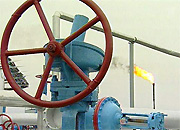Getting the shale gas out requires drilling hundreds of wells and blasting the rock with water and chemicals, raising environmental objections in densely populated Europe. Those obstacles suggest Russia’s OAO Gazprom, supplier of 25 percent of Europe’s gas, will have plenty of customers for its fuel pumped through new pipelines across the Baltic and Black Seas.
“There is a great future for Russian gas in Europe,” John Barry, a strategic issues manager at Royal Dutch Shell Plc, said in an interview. “There is a lot of unconventional gas in Europe, but it’s a very, very early part of the story.” Shell has already faced public opposition to plans to explore in Sweden for shale gas.
Across the Atlantic, where BP Plc is drilling fields in Oklahoma and Texas, Chief Executive Officer Tony Hayward has described shale gas as a “game changer” that allowed the U.S. to overtake Russia in terms of overall gas production last year and drove prices lower.
“If you go to Dallas, you can see wells around the airport for non-conventional gas,” said Jean-Francois Cirelli, vice- chairman of GDF Suez, operator of Europe’s largest gas grid. “Would it be possible to have these wells surrounding Orly or Roissy airports in Paris?”
Europe’s unconventional gas reserves may total 1,200 trillion cubic feet, according to Shell, about five times the continent’s proven gas reserves.
Unconventional gas is the industry term to describe the fuel trapped in shale formations; coal-bed methane, which originates on the surface of coal and can be extracted when pressure on the seams is reduced; and tight gas, which is locked in impermeable sandstone rock.
The International Energy Agency said in November it doesn’t see unconventional gas production in Europe as “changing substantially” the overall supply picture until about 2020.
The Paris-based adviser to 28 industrialized nations expects unconventional gas output in Europe to reach about 15 billion cubic meters a year by 2030, about 7 percent of the region’s total production of natural gas.
EU gas demand is expected to rise 2 percent to 554.1 billion cubic meters this year, with domestic output only meeting about 50 percent of that total, according to Wood Mackenzie Consultants Ltd.’s estimates. That leaves the region dependent on pipeline supplies from Russia, Norway and Algeria.
“We don’t see a huge impact of unconventional gas” on supplies in Europe in the next 10 years, said Rhodri Thomas, an analyst at Wood Mackenzie in Edinburgh. “That’s purely because the geology has yet to be proven.”
That hasn’t stopped Exxon Mobil Corp., Shell and Marathon Oil Corp. among others from snapping up vast tracts of land in Europe to explore for shale gas. Poland, Hungary, Germany and Sweden have attracted the most interest to date. Shell is exploring for shale gas in Ukraine.
“In Europe at the moment it’s a big land grab, you’ve got a lot of people trying to mark out their territory,” said Andrew Austin, chief executive officer of IGas Energy Plc, a U.K. developer of coal-bed methane in England and Wales. “What shale can give Europe is an alternative” to imports.
Not every attempt in Europe has been successful. Exxon Mobil quit a project in Hungary in February after failing to find commercial reserves.
The largest U.S. oil company has acquired unconventional gas leases in Poland and Germany “to apply new technologies here in Europe to develop large reserves of natural gas contained in tight, hard rocks,” said Brad Corson, vice president of Exxon Mobil Production Co.
Gazprom, which has agreed to provide GDF Suez with additional volumes, forecast a “slight” increase in its market share in Europe in the future
“We are going to be one of the major gas suppliers to the European market over many decades to come,” Gazprom spokesman Sergei Kupriyanov said.
E.ON Ruhrgas AG, the gas arm of Germany’s largest utility, said shale fuel could contribute toward Europe’s energy security over time.
“We still need a certain amount of time to arrive at a truly reliable assessment of possibilities here in Europe,” said Helmut Roloff, an Essen-based spokesman for the unit.
"Business Week"
01 Марта 2026 | воскресенье | 04:22


